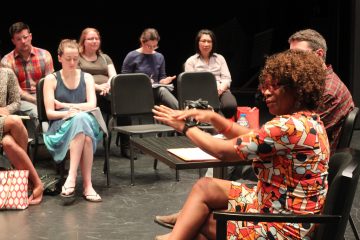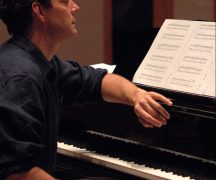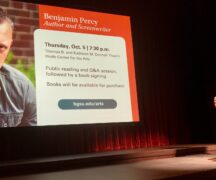By DAVID DUPONT
BG Independent News
Rita Dove, a Pulitzer Prize winner and former Poet Laureate, almost stopped writing poetry.
Her home had been struck by lightning and was destroyed, she told her audience at Bowling Green State University Thursday night. Rebuilding so consumed her that when someone asked what was next for her as a poet, she questioned whether she’d ever write again. “I’m done. I just need to get my life in order.”
That was in 1998. She’d already served as the youngest and first black Poet Laureate of the United States and won the Pulitzer Prize for “Thomas and Beulah,” a collection of poems inspired by her grandparents.
Then a neighbor asked Dove and her husband, Fred Viebahn, to go out to a local dinner dance as a way of cheering them up. They were fascinated by the dancing, and wanted to join. They ended up taking ballroom dancing lessons, and now do it competitively.
The dancing inspired poems. In “Foxtrot Fridays,” she writes, of how dancing keeps problems at bay with: “Just the sweep of Paradise / and the space of a song / to count all the wonders in it.”

Rita Dove discusses poetry with creative writing students.
Dove was on campus as the keynote speaker for the Edwin H. Simmons Creative Minds Series. During the day she spent time meeting and conversing with students. At 11 a.m. she was seated on the stage of the Donnell Theatre surrounded by creative writing students.
This was an “inhuman” hour for her, Dove said. She usually writes from midnight to 6 a.m.
Does she write every day? That was the first question posed.
Dove said while she doesn’t necessarily sit down at her desk and write daily, she’s always “writing,” adding “I always have that attitude.”
Even while traveling she has with her “a notebook or three or nine” and her phone is handy to take notes. The poet did advise the two dozen or so students that they should write every day. This practice is akin to athletes training or musicians doing their scales. “When inspiration strikes, you’re ready.”
The disadvantage, she said, is “you write a lot of junk.”
But there’s a lesson in that as well. “It inures you to having to be perfect the first time.”
Dove spoke of how her own poems take shape. She works on several at once, each assigned to a different color folder. As she starts working, she’ll select the colored folder that suits her mood.
The poems evolve slowly, and finally she comes to the point “I can do no more.” Sometime “it’s as if the work is saying: ‘I’m tired of you.’”
Dove also spoke of her relationship to music. She often listens to music while writing. It may be related to what she’s writing. When she was working on her book “Sonata Mulaticca” about George Bridgetower, a mixed race violinist in 18th century Europe, she listened to classical music from the period.
Jazz, though, is what she usually listens to. It best echoes the syncopation of contemporary syntax.
Dove studied cello when she was young and even contemplated a professional career. She’s still active, adding viola de gamba, and more recently voice. She started to study voice she told the students because it was a musical instrument she could take wherever she goes.
“Poetry,” she said, “is another way of singing.”
Later in her keynote address, she was in fine voice. And music floated through the poems she read.
Dove, an Akron native, said that every time she travels back to Ohio from Charlottesville, Virginia where she lives, and crosses the Ohio River, she feels like she’s returning home, “like a little piece of me is slotted into place.”
She evoked her hometown with a poem about the Quaker Oats man, in honor of the Akron-based company. She brings the Quaker on the box to life as a giant benevolent figure who nourishes children in so many ways.
Other poems celebrate entertainers. We meet Champion Jack Dupree whose “every song is written by Shakespeare and his mother-in-law.”
Her poem “Canary” to Billie Holiday ends with the admonition: “If you can’t be free, be a mystery.”
Hattie McDaniel, the first African-American to receive an Oscar, makes a grand entrance to the Academy Awards to be honored for her role as a maid in “Gone With the Wind.”
Dove describes her “huge face a dark moon, split by that spontaneous smile, your trademark, your curse.”
Not only entertainers’ smiles captivate Dove.
In “Maple Valley Branch Library, 1967” she recalls making up research projects so she could ask the librarian all manner of obscure questions.
“But all I wanted to know was:
Tell me what you’ve read that keeps
That half smile afloat
Above the collar of your impeccable blouse.”
The library was a place of wonder: “All the time in the world was there, and sometimes all the world on a single page.”
The poet carried her home with her wherever she went. She recalled her grandmother who made hats for all the church ladies, hats that were “landscapes.”
Her grandmother had always wanted to go to Paris, but never did. Still she seems to be shadowing her granddaughter in the poem “Island Women of Paris.”
These women arrived in the grand European capital thanks to imperialism. They remain regal. “Better not look an island woman in the eye — / unless you like feeling unnecessary,” Dove recited.
She concluded the reading with newer poems that sprang from her life as a mother, poet, and teacher.
In one she gave herself the kind of assignment she gives her students. She had to write a poem in which each word in each line started with the same letter. The prepositions, she said, were trouble.
When her now grown daughter was about 5, the daughter would sing “nobody loves me but the spring cricket.”
Her parents didn’t understand, but Dove wrote a poem from the cricket’s point of view.
And when a student asked her to contribute to prose poem to a magazine he edited, she teased him: “I don’t know if I believe in prose poems. Maybe an anti-prose poem.”
She closed with that humorous offering: “It’s supposed to be prose if it runs on and on, isn’t it? All those words, too many to fall into rank and file, stumbling bare-assed drunk onto the field reporting for duty, yessir.”
She concludes the poem with a comparison to poetry, which with its open spaces, is like music.
The full house in the Donnell Theatre roared its approval.
“That was so good! So good! So good!” Aubre Siler said at the end. The Toledo School for the Arts student studies creative writing, and writes poems. This was the first poetry reading she’d attended. A good place to start.





